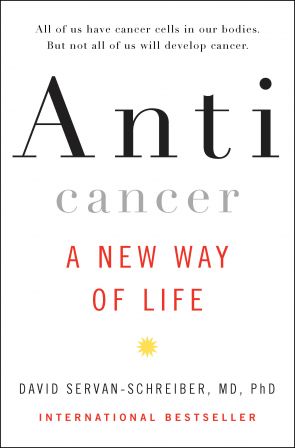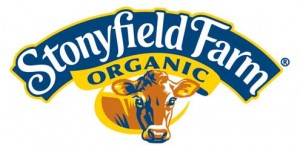I wish I would have known about this earlier! Stonyfield is giving away 1,000 autographed copies of David Servan-Schreiber’s Anticancer in the month of January. The first 200 people to sign up each week (for five weeks) will get a book.
The book sounds fantastic! I tried signing up this week but all the books are gone. Here is the schedule for the book giveaway.
About Anticancer
When David Servan-Schreiber, a dedicated scientist and doctor, was diagnosed with brain cancer, his life changed. Confronting what medicine knows about the illness and the little-known workings of his body’s natural cancer-fighting capabilities, and marshaling his own will to live, Servan-Schreiber found himself on a fifteen-year journey from disease and relapse into scientific exploration and, finally, to health. Combining memoir, concise explanation of what makes cancer cells thrive and what inhibits them, and drawing on both conventional and alternative ways to slow and prevent cancer, Anticancer is revolutionary.
Excerpt From Anticancer
Foods That Act Like Medications
From ANTICANCER: A New Way of Life by David Servan-Schreiber, MD, PhD
Foods That Act Like Medications
If certain foods in our diet can act as fertilizers for tumors, others, to the contrary, harbor precious anticancer molecules. As recent discoveries show, these go far beyond the usual vitamins, minerals, and antioxidants.
In nature, when confronted with aggression, vegetables can neither fight nor flee. To survive,they must be armed with powerful molecules capable of defending them against bacteria,insects, and bad weather. These molecules are phytochemical compounds with antimicrobial, antifungal, and insecticide properties that act on the biological mechanisms of potential aggressors. They also have antioxidant properties that protect the plant’s cells from dampness and the sun’s rays (by preventing cellular “rust” from forming when the cell’s fragile mechanisms are exposed to the corrosive effects of oxygen).
Plums, Peaches, and Nectarines: It’s Time for Stone Fruit
Berries have recently found some competition: peaches, plums, nectarines, etc. (collectively known as stone fruit), whose anticancer virtues were previously unknown. According to a group of researchers in Texas who reviewed more than a hundred species, these fruits—particularly plums—are at least as rich in anticancer elements as small berries. In this time of economic recession, it’s good to know that a single plum contains as many antioxidants as a handful of berries and costs far less. In laboratory tests, stone fruits have also demonstrated their efficacy against breast cancer cells and cholesterol.
Probiotics
The intestines ordinarily contain “friendly” bacteria, which help digestion and facilitate regular bowel movements. They also play an important stabilizing role for the immune system. Among the most common of these bacteria are Lactobacillus acidophilus and Lactobacillus bifidus.
It has been demonstrated that these probiotics inhibit the growth of colon cancer cells. Their effect on the facilitation of bowel movements also lowers the risk of colon cancer by reducing the time the intestines are exposed to carcinogenic substances in food. Probiotics thus also play a role in detoxification. In addition, according to a 2006 Korean study, probiotics improve the performance of the immune system, as well as increasing the number of NK cells.
Organic yogurts and kefir are good sources of probiotics. Soy yogurts are usually enriched with probiotics. These precious bacteria are also found in sauerkraut and kimchi. Finally, certain foods are prebiotics, which means they contain polymers of fructose, which stimulate the growth of probiotic bacteria. Examples are garlic, onions, tomatoes, asparagus, bananas, and wheat.
Green Tea
Rich in polyphenols, including catechins (and particularly epigallocatechin gallate-3, or EGCG), which reduce the growth of the new vessels needed for tumor growth and metastases. It is also a powerful antioxidant and detoxifier (activating enzymes in the liver that eliminate toxins from the body), and it facilitates the death of cancer cells by apoptosis. In the laboratory,it enhances the effects of radiotherapy on cancer cells.
Turmeric and Curry
Turmeric (the yellow powder that is one of the components of yellow curry) is the most powerful natural antiinflammatory identified today. It also helps stimulate apoptosis in cancer cells and inhibit angiogenesis. In the laboratory, it enhances the effectiveness of chemotherapy and reduces tumor growth.
Take note: To be assimilated by the body, turmeric must be mixed with black pepper (not simply with peppers). Ideally, it must also be dissolved in oil (olive, canola, or linseed oil, preferably). In store-bought curry mixes, turmeric represents only 20 percent of the total. So it’s better to obtain turmeric powder directly.
Recommendations for use: Mix ¼ teaspoon of turmeric powder with ½ tablespoon of olive oil and a generous pinch of black pepper. Add to vegetables, soups, and salad dressings. A few drops of agave nectar can remove the slightly bitter taste.


















This is a great book . I hope to find help with my Diabetes,Gastroparesis, Nueropathy, and Maculargeneration as well.
enyl(at)inbox(dot)com